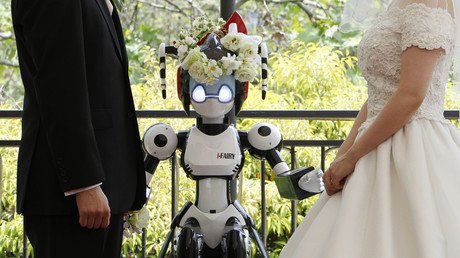Robot rights a major threat to humans – AI experts slam EU plan
A group of 150 robotics experts are hoping to short circuit any plans the European Union might have to give machines legal status, suggesting it could dilute human rights.
In an open letter, scores of researchers in the field of science and ethics have put their weight behind opposing a European Parliament report, which recommends sophisticated robots be given an “electronic persons” legal status.
The recommendations, which included setting up a regulatory agency for AI, are due to be presented to the European Commission. However, a paragraph in the Civil Law Rules on Robotics about creating a legal status for robots has scientists fighting the human corner.
First ever robot with citizenship: The lucky machine is Sophia the Humanoid https://t.co/JsOtsCkuETpic.twitter.com/ESwEZiRLcx
— RT (@RT_com) October 29, 2017
The group is calling for the legal, societal and economical impact of artificial intelligence to be studied at haste, but not to the detriment of human rights. It appears to have an issue with a line in paragraph 59 of a 2017 European Union report, mentioning a vague and undefined ‘electronic persons’ status.
READ MORE: Robot kill switches & legal status: MEPs endorse AI proposal
“The European Parliament calls on the Commission to explore, analyse and consider the implications of all possible legal solutions, such as creating a specific legal status for robots in the long run, so that at least the most sophisticated autonomous robots could be established as having the status of electronic persons responsible for making good any damage they may cause, and possibly applying electronic personality to case where robots make autonomous decisions,” the EU Parliament report states.
Open letter signatories opposing the scheme include Noel Sharkey of the Foundation for Responsible Robotics, Alan Winfield from the Human Brain Project, as well as Nathalie Nevejans, an expert in robot ethics at the European Parliament.
“From an ethical and legal perspective, creating a legal personality for a robot is inappropriate whatever the legal status model,” they group said.
“The legal status from a robot can’t derive from the Natural Person Model, since the robot would then hold human rights, such as the right to dignity...or the rights to citizenship, thus directly confronting the human rights,” they added.
READ MORE: Sex dolls uncovered: The kinks, quirks and risks of building robolove (GRAPHIC VIDEO)
Author of ‘Our Final Invention’ – a book analysing the risks of artificial intelligence – James Barrat believes talk of giving legal status is a step too far, especially since robot technology is some way off the depictions of self-determining machines of science fiction.
AI weaponry under scrutiny as UN meets over ‘killer robots’ (VIDEOS, POLL) https://t.co/akktxGFUKH
— RT (@RT_com) November 13, 2017
“We’re jumping way ahead,” Barrat told RT.com. “If you give machines legal status you degrade actual human rights. If you give them rights under law and protection you degrade the rights of actual humans.”
He added: “There’s no legal body that will enforce the rights of robots so they don’t have the same measurement of deserving rights. And that measurement is they don’t have expectations about the future… so rights for robots are really meaningless right now.”
Like this story? Share it with a friend!














